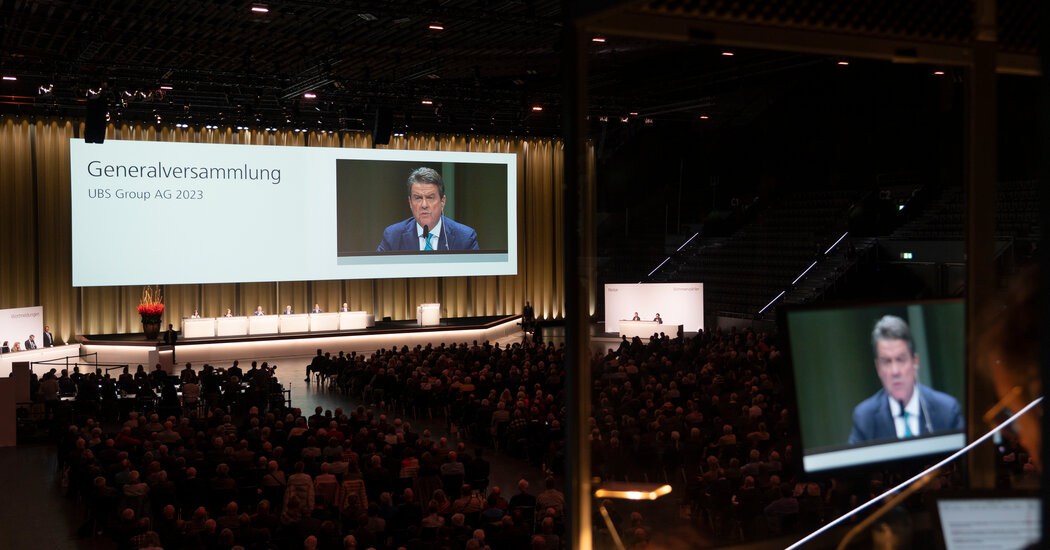UBS is at great risk as it prepares to absorb its old arch-rival, Credit Suisse, the bank’s chairman warned shareholders at its annual meeting on Wednesday.
In his first address to UBS shareholders since the acquisition of Credit Suisse was announced on March 19, Colm Kelleher, its chairman, said the $3.2 billion deal — brokered on behalf of the Swiss government — was the first combined two banks designated by regulators as ‘systemically important’.
It was a recognition that the acquisition of Credit Suisse, which imploded during the recent banking crisis due to longstanding concerns about its history of scandals and financial losses, will present challenges. When announcing the deal, the Swiss government said it was ready to support UBS with billions of dollars worth of financial guarantees. (That said, the deal values Credit Suisse at a fraction of where it traded before the acquisition was announced.)
“You can’t just add numbers together and arrive at a figure,” Mr. Kelleher told the more than 1,100 shareholders gathered at the St. Jakobshalle arena in Basel, Switzerland. “You have to understand that there is tremendous risk in integrating these companies.”
UBS Vice Chairman Lukas Gähwiler noted the speed with which the company had to complete the transaction. “We only had 48 hours to conduct our due diligence,” he said. “So many questions remain unanswered.”
At a press conference in Bern on Wednesday, the president of FINMA, Switzerland’s financial regulator, said the agency had considered putting Credit Suisse out of business before deciding that selling it to UBS was the best way to prevent the Swiss and global financial markets would be disrupted.
Shotgun mergers to bail out failing banks have had a checkered history. JPMorgan Chase CEO Jamie Dimon has publicly complained about the headaches and legal costs associated with the acquisition of Bear Stearns and Washington Mutual during the 2008 financial crisis. It is an experience that Mr. Kelleher, then the chief financial officer from Morgan Stanley, witnessed up close.
But UBS officials were also quick to argue on Wednesday that their company — which was bailed out by the Swiss government during the 2008 crisis — was in a much stronger financial position. Unlike Credit Suisse, which lost billions in recent years due to poor trading bets, UBS has focused primarily on managing wealthy clients’ money, a much less risky business.
Mr. Kelleher reiterated that his company planned to close large parts of Credit Suisse’s investment bank to continue UBS’s emphasis on more stable operations.
“Our strategy is clear and unchanged,” he said, adding that risk management and preventing financial crime were the main focuses of UBS’s board — perhaps an indirect reference to its fallen rival’s checkered history.
But UBS executives said it was too early to say how many employees would lose their jobs if the two banks merge. Vincent Kaufmann of the Ethos Foundation, a prominent shareholder, said during his appearance at the lectern: “We expect UBS to demonstrate social responsibility by preserving as many jobs as possible.”
Wednesday’s event was much less solemn than Credit Suisse’s last shareholder meeting, held in Zurich on Tuesday. At that meeting, speakers repeatedly took to the microphone to accuse executives of obscuring the 167-year-old bank, an icon of the Swiss banking industry.
At the UBS meeting, some shareholders said they feared the Credit Suisse takeover would create one giant institution that would dominate Swiss banking. UBS officials countered that criticism, arguing that the combined company would still have to compete with dozens of smaller banks.
Climate activists also spoke out. Two demanded that UBS’s board refuse to do business with fracking companies it would inherit from Credit Suisse, a major financier of oil and gas companies. Others greeted incoming shareholders outside the arena with inflatable props and banners denouncing “fossil banks.”

